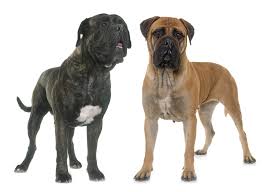
Bullmastiff
Conditions of detention
Bullmastiffs are adaptable and can live comfortably in both houses and apartments, provided they get enough exercise. They are relatively inactive indoors but need regular walks to stay healthy.
Useful Fact: Due to their size, Bullmastiffs require ample space to move around comfortably, even if they are relatively calm indoors.
Nutrition and diet
Bullmastiffs need a balanced diet rich in high-quality proteins and fats to support their muscular build. It’s essential to avoid overfeeding to prevent obesity.
Useful Fact: Feeding Bullmastiffs two smaller meals a day instead of one large meal can help prevent bloat, a common health issue in large breeds.
Health
Bullmastiffs are generally healthy but can be prone to certain genetic conditions such as hip dysplasia, elbow dysplasia, and certain types of cancer. Regular vet check-ups are crucial.
Useful Fact: Due to their short noses, Bullmastiffs can suffer from brachycephalic syndrome, which can cause breathing difficulties in hot and humid conditions.
Grooming and care
Bullmastiffs have a short, dense coat that requires minimal grooming. Regular brushing will help keep their coat healthy and reduce shedding.
Useful Fact: Bullmastiffs are known to drool, so keeping a cloth handy for wiping their mouths can help keep them clean.
Education and training
Bullmastiffs are intelligent and willing to please but can be somewhat stubborn. Consistent, positive reinforcement training methods work best.
Useful Fact: Early socialization and training are crucial to prevent any potential aggression and ensure they grow into well-mannered adults.
Toys and entertainment
Bullmastiffs enjoy interactive toys that challenge their minds and engage them physically. Strong, durable chew toys are ideal.
Useful Fact: Due to their powerful jaws, it’s important to select robust toys that can withstand heavy chewing.
Safety
Bullmastiffs should be supervised around children and other animals due to their large size and strength. A secure, fenced area is recommended for playtime.
Useful Fact: Bullmastiffs are naturally protective and can be wary of strangers, making early socialization critical for safety.
Accessories
Essential accessories for Bullmastiffs include a strong collar and leash, a comfortable bed, food and water bowls, and grooming tools.
Useful Fact: A harness is often recommended for Bullmastiffs to reduce strain on their necks and provide better control during walks.
Socialization
Early socialization with different people, animals, and environments is vital for Bullmastiffs. This helps them become well-adjusted and confident.
Useful Fact: Regular exposure to various situations and stimuli can help prevent fearfulness and aggression in Bullmastiffs.
Travel and Transportation
Bullmastiffs can travel well if accustomed to it from a young age. It’s important to use a secure crate or seatbelt harness for car travel to ensure safety.
Useful Fact: Due to their size, planning for travel accommodations, such as larger crates and sufficient space, is essential.
Behavior and psychology
Bullmastiffs are known for their loyal, protective, and gentle nature. They form strong bonds with their families and are generally good with children.
Useful Fact: Understanding their protective instincts and providing proper training can help manage their natural guarding behavior.
Legal aspects
In some regions, there may be breed-specific legislation affecting Bullmastiffs. It’s important to be aware of local laws and regulations regarding their ownership.
Useful Fact: Compliance with local breed-specific laws ensures that Bullmastiff owners avoid legal issues and maintain responsible ownership.


